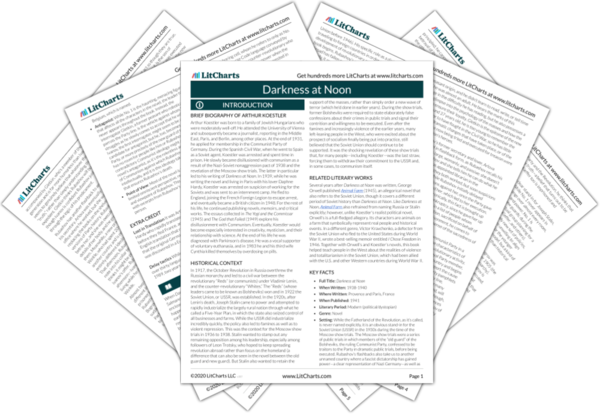Ivanov Quotes in Darkness at Noon
“But we had descended into the depths, into the formless, anonymous masses, which at all times constituted the substance of history; and we were the first to discover her laws of motion. We had discovered the laws of inertia, of the slow changing of her molecular structure, and of her sudden eruptions. That was the greatness of our doctrine. The Jacobins were moralists; we were empirics. We dug in the primeval mud of history and there we found her laws. We knew more than ever men have known about mankind; that is why our revolution succeeded. And now you have buried it all again….”
“History is a priori amoral; it has no conscience. To want to conduct history according to the maxims of the Sunday school means to leave everything as it is. You know that as well as I do. You know the stakes in this game, and here you come talking about Bogrov’s whimpering….”
“We whip the groaning masses of the country towards a theoretical future happiness, which only we can see. For the energies of this generation are exhausted; they were spent in the Revolution; for this generation is bled white and there is nothing left of it but a moaning, numbed, apathetic lump of sacrificial flesh….Those are the consequences of our consequentialness.”
“We all thought one could treat history like one experiments in physics. The difference is that in physics one can repeat the experiment a thousand times, but in history only once.”
Instead of the old portraits, a light patch shone from Ivanov’s wallpaper; philosophical incendiarism had given place to a period of wholesome sterility. Revolutionary theory had frozen to a dogmatic cult, with a simplified, easily graspable catechism, and with No. 1 as the high priest celebrating the Mass.

Ivanov Quotes in Darkness at Noon
“But we had descended into the depths, into the formless, anonymous masses, which at all times constituted the substance of history; and we were the first to discover her laws of motion. We had discovered the laws of inertia, of the slow changing of her molecular structure, and of her sudden eruptions. That was the greatness of our doctrine. The Jacobins were moralists; we were empirics. We dug in the primeval mud of history and there we found her laws. We knew more than ever men have known about mankind; that is why our revolution succeeded. And now you have buried it all again….”
“History is a priori amoral; it has no conscience. To want to conduct history according to the maxims of the Sunday school means to leave everything as it is. You know that as well as I do. You know the stakes in this game, and here you come talking about Bogrov’s whimpering….”
“We whip the groaning masses of the country towards a theoretical future happiness, which only we can see. For the energies of this generation are exhausted; they were spent in the Revolution; for this generation is bled white and there is nothing left of it but a moaning, numbed, apathetic lump of sacrificial flesh….Those are the consequences of our consequentialness.”
“We all thought one could treat history like one experiments in physics. The difference is that in physics one can repeat the experiment a thousand times, but in history only once.”
Instead of the old portraits, a light patch shone from Ivanov’s wallpaper; philosophical incendiarism had given place to a period of wholesome sterility. Revolutionary theory had frozen to a dogmatic cult, with a simplified, easily graspable catechism, and with No. 1 as the high priest celebrating the Mass.
















